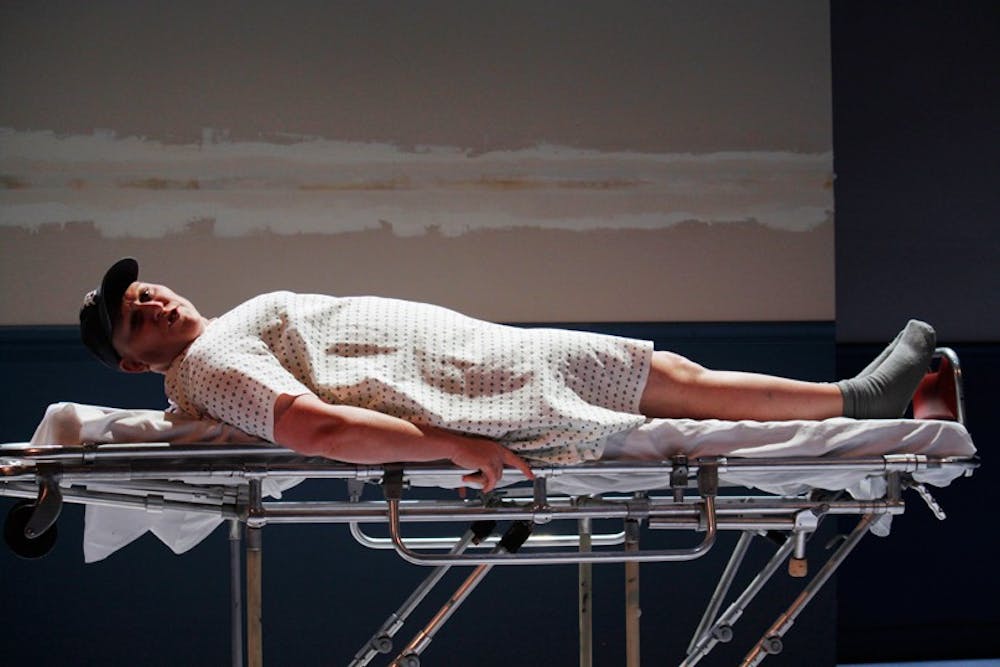By David Seaman | Echo
Death. It haunts us, hangs over us. We fear confronting it, accepting it. The concept takes on many meanings.
Is death a period, ending life as we have experienced it forever? Is it a comma, representing just a brief pause before we enter another life? Or is it a semicolon, an ending to the sentence of life before continuing to the next chapter?
Death and punctuation hang over "Wit," the Pulitzer Prize-winning play by Margaret Edson. Taylor Theatre's 2014-15 season opener depicts the final hours of a cancer-ridden English professor. Under the tight direction of English professor Joe Ricke, this integration of humanity, loss, pain and, yes, wit, runs for a brisk two hours. But its impression on viewers will last much longer.
https://www.youtube.com/watch?v=aCt1do9RLqA
University English professor Dr. Vivian Bearing specializes in the Renaissance poetry of John Donne. She has dedicated her entire life to exploring the concept of wit in poems such as Donne's sonnet "Death Be Not Proud." But the analyzer becomes the one analyzed when she is diagnosed with stage IV ovarian cancer.
As Bearing goes through medical tests and rounds of treatment, Bearing addresses the audience, allowing it to see the flashbacks that shaped her cold, researching point of view. Through relaying the facts, she slowly begins to see the humanity that was absent from her life, shown through the kindness of caretakers. Bearing witnesses how her impersonal actions unknowingly and darkly affected a former pupil, now one of her caretakers.

Director of Theatre Tracy Manning transforms herself into the character of Dr. Bearing. Manning convincingly conveys the arrogance and sense of superiority Bearing possesses at the beginning of the play and effectively peels back the layers to reveal a more relatable soul.
A solid cast of students fill roles as hospital staff and students. Other leads include Ryan Maloney ('13), Master of Higher Arts in Education student Hannah Adderley and professor of mathematics Matt DeLong.
Maloney's turn as clinical fellow Jason Posner creates an interesting parallel with Bearing's character. He is a young man rising in the ranks like a young Bearing once did. Their conversations reveal the play's central themes. Adderley balances Posner's intellectualism with kindness as nurse Susie, providing the opposite viewpoint of humanity over reason.
If Bearing and Posner's discussions are the most stimulating of the play, the conversations between Bearing and Susie are the most poignant. Music professor Patricia Robertson also provides comfort as Bearing's former professor E.M. Ashford, and DeLong is solid as the intellectual Dr. Kellekian.
The set greatly enhances the mood of the play. Baby blue and white bathe the hospital room, creating a calm yet sterile environment. It is both warm and cold, inviting and repelling. The set is deceptively simple. Artificial hospital lights, usually absent from most productions of the play, are added to great effect here.
Lights, colors, props . . . every item acts like another character in the play. Every time Bearing lies on a hospital bed, she is humbled. She seems vulnerable and small compared to what is coming. Each monologue on the bed becomes more and more painful.

Despite heavy subject matter, the play makes time for humor. Manning has good lines. "The attention was good for the first five minutes," Bearing laments about her examinations. "Now I know how poems feel."
But it's the progression from dry, reasoning wit to painful declarations of emotion that drive the play. Bearing needs proper punctuation for death and life to understand them, just like the right punctuation is needed to interpret Donne's poems.
For all the plays on words, for all the discussions on the meaning of wit, Bearing cannot hide from the fact death looms. The theme is common and surprisingly simple: We want greater meaning in the things of life, and we expect deep philosophical musings-except sometimes the most affecting themes are the simplest.
Knowledge that death is a simple concept and not an abstract one is necessary. Death should not be proud because life is fully lived before it intrudes. For human beings, in all their humanity, are only at a pause, a comma.
Death has ended one life, but an even fuller one is about to begin.
It's simple. But death, in all its cold, conceptual facts and complexity . . . death shall eventually and truly die. Period.
"Wit" premiered last night and will run Friday and Saturday at 8 p.m. and Sunday at 2 p.m. All tickets are $7 and can be purchased at the theater box office located in Rupp. Proceeds benefit the Jason Francis Memorial Scholarship.





